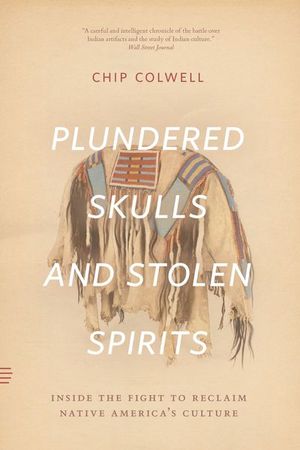Plundered Skulls and Stolen Spirits
Published by The University of Chicago Press
A leading anthropologist “explores the fraught project of repatriating Native American sacred objects in this moving and thoughtful work” (Publishers Weekly).
Who own the objects that connect us to history? And who has the right to decide, particularly when the objects are sacred or, in the case of skeletal remains, human? As senior curator of anthropology at the Denver Museum of Nature & Science, Chip Colwell has navigated questions like these firsthand. In Plundered Skulls and Stolen Spirits, he examines how to weigh the religious freedom of Native Americans against the academic freedom of scientists—and whether the emptying of museum shelves elevates human rights or destroys a common heritage.
Today, hundreds of tribes use the Native American Graves Protection and Repatriation Act to recover their looted heritage from museums across the country. Colwell shares a personal account of this process, following the trail of four objects as they were created, collected, and ultimately returned to their sources: a sculpture that is a living god, the scalp of a massacre victim, a ceremonial blanket, and a skeleton from a tribe considered by some to be extinct.
These stories reveal a dramatic process that involves not merely obeying the law, but negotiating the blurry lines between identity and morality, spirituality and politics. Repatriation, Colwell argues, is a difficult but vitally important way for museums and tribes to heal the wounds of the past while creating a respectful approach to caring for these rich artifacts of history.
Who own the objects that connect us to history? And who has the right to decide, particularly when the objects are sacred or, in the case of skeletal remains, human? As senior curator of anthropology at the Denver Museum of Nature & Science, Chip Colwell has navigated questions like these firsthand. In Plundered Skulls and Stolen Spirits, he examines how to weigh the religious freedom of Native Americans against the academic freedom of scientists—and whether the emptying of museum shelves elevates human rights or destroys a common heritage.
Today, hundreds of tribes use the Native American Graves Protection and Repatriation Act to recover their looted heritage from museums across the country. Colwell shares a personal account of this process, following the trail of four objects as they were created, collected, and ultimately returned to their sources: a sculpture that is a living god, the scalp of a massacre victim, a ceremonial blanket, and a skeleton from a tribe considered by some to be extinct.
These stories reveal a dramatic process that involves not merely obeying the law, but negotiating the blurry lines between identity and morality, spirituality and politics. Repatriation, Colwell argues, is a difficult but vitally important way for museums and tribes to heal the wounds of the past while creating a respectful approach to caring for these rich artifacts of history.
BUY NOW FROM
COMMUNITY REVIEWS
